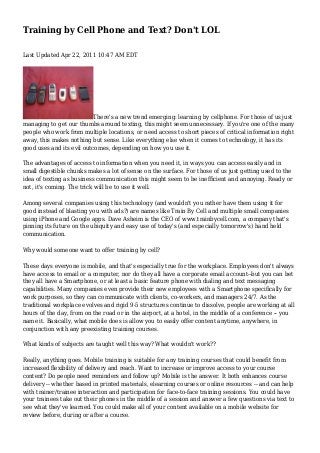
Training by Cell Phone and Text? Don't LOL
- 1. Training by Cell Phone and Text? Don't LOL Last Updated Apr 22, 2011 10:47 AM EDT There's a new trend emerging: learning by cellphone. For those of us just managing to get our thumbs around texting, this might seem unnecessary. If you're one of the many people who work from multiple locations, or need access to short pieces of critical information right away, this makes nothing but sense. Like everything else when it comes to technology, it has its good uses and its evil outcomes, depending on how you use it. The advantages of access to information when you need it, in ways you can access easily and in small digestible chunks makes a lot of sense on the surface. For those of us just getting used to the idea of texting as business communication this might seem to be inefficient and annoying. Ready or not, it's coming. The trick will be to use it well. Among several companies using this technology (and wouldn't you rather have them using it for good instead of blasting you with ads?) are names like Train By Cell and multiple small companies using iPhone and Google apps. Dave Asheim is the CEO of www.trainbycell.com, a company that's pinning its future on the ubiquity and easy use of today's (and especially tomorrow's) hand held communication. Why would someone want to offer training by cell? These days everyone is mobile, and that's especially true for the workplace. Employees don't always have access to email or a computer, nor do they all have a corporate email account--but you can bet they all have a Smartphone, or at least a basic feature phone with dialing and text messaging capabilities. Many companies even provide their new employees with a Smartphone specifically for work purposes, so they can communicate with clients, co-workers, and managers 24/7. As the traditional workplace evolves and rigid 9-5 structures continue to dissolve, people are working at all hours of the day, from on the road or in the airport, at a hotel, in the middle of a conference -- you name it. Basically, what mobile does is allow you to easily offer content anytime, anywhere, in conjunction with any preexisting training courses. What kinds of subjects are taught well this way? What wouldn't work?? Really, anything goes. Mobile training is suitable for any training courses that could benefit from increased flexibility of delivery and reach. Want to increase or improve access to your course content? Do people need reminders and follow up? Mobile is the answer. It both enhances course delivery -- whether based in printed materials, elearning courses or online resources -- and can help with trainer/trainee interaction and participation for face-to-face training sessions. You could have your trainees take out their phones in the middle of a session and answer a few questions via text to see what they've learned. You could make all of your content available on a mobile website for review before, during or after a course.
- 2. We've found that while there is a strong desire to use mobile for learning and communicating, the small size of mobile phones doesn't really lend itself to taking a long, extensive course built for a computer. Webmeetings are awkward as well. Tablets like the iPad will change this, but for now our research shows that the mobile phone is best used to deliver "just-in-time" information in small chunks, not as a substitute for in-person training or multipart e-learning courses. Certainly if you're looking for critical information in a hurry, having access to it by phone beats thumbing through the manual, which is probably back in your office anyway. How have learners responded? Our clients have responded well, and their employees appreciate the added accessibility of information when it's mobile. While Dave is in the business of putting a sunny face on the industry, I have some guidelines for what will work well in this format and what won't. Feel free to post, argue, disagree and have at it: What will work: small chunks of information like checklists and regulations Follow-up reminders about skills learned in other formats One on one coaching What won't work: multi-person video conferencing and chat Anything that requires large fonts and clearly reading the screen for critical data. We ain't all 25 any more. Anything that requires a lot of written input. Typing on a phone is still a pain in the thumbs for most of us. The good news is that we're running out of excuses for remaining ignorant of how to do our jobs better. If we need information, we have more ways to access it than ever before. The bad news is that somewhere, someone is working on the brain/chip implant that will render all of this obsolete. Read more: Photo by flickr user Chris Garrison CC 2.0 © 2011 CBS Interactive Inc.. All Rights Reserved. http://www.cbsnews.com/news/training-by-cell-phone-and-text-dont-lol/